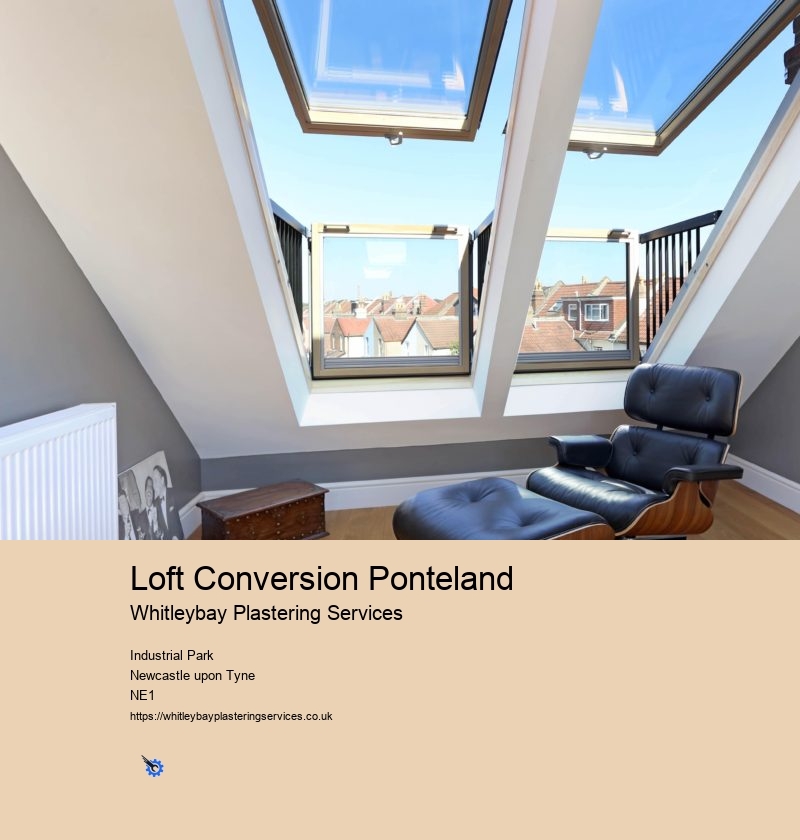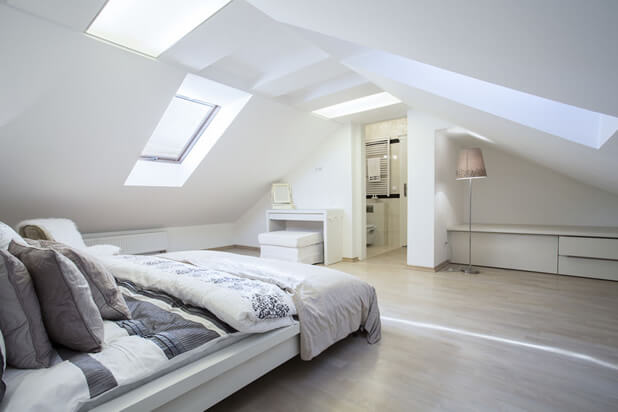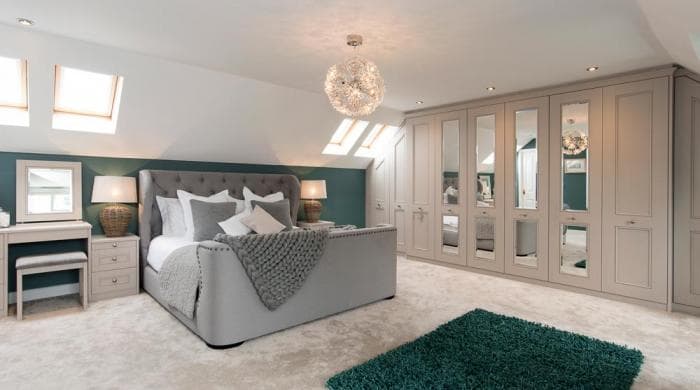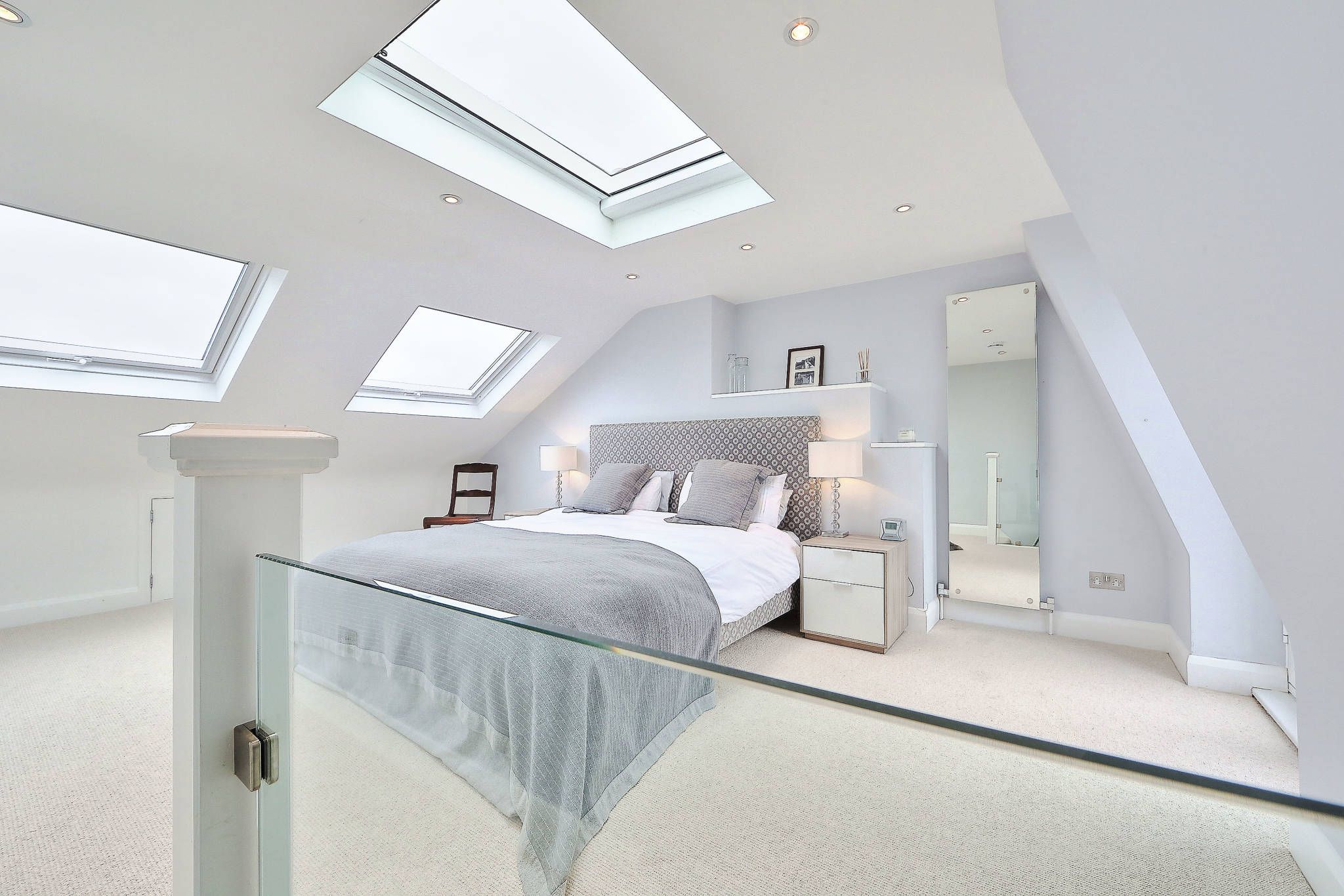Loft Conversion Ponteland
Loft Conversion Newcastle-upon-Tyne
Generally speaking, a basic dormer loft conversion in Newcastle-upon-Tyne typically starts at around £20,000, with most conversions costing between £25,000 and £35,000. However, the cost can be higher or lower depending on the size and complexity of the job, as well as the contractor you choose.
In addition to planning permission, you may also be required to obtain a building regulation approval. This is essentially a set of standards that the structure must meet in order to be deemed safe and secure. The building regulation approval is typically issued by an independent expert, such as an architect or surveyor, who will inspect the work to ensure that it meets the necessary standards. The cost of obtaining a building regulation approval will depend on the size and scope of the project, so it is important to factor this into your budget.
Another important factor to consider is what type of loft conversion you want. Do you want to create a bedroom, an office, a storage area, or something else? The type of loft conversion you choose will depend on what you intend to use the extra space for. For example, if you want to create an extra bedroom, it is important to ensure that you will have adequate headroom and ventilation for the space to be comfortable and safe.
If you’re looking to maximize the living space in your Newcastle-upon-Tyne home, a mansard loft conversion may be the best option. This type of conversion involves extending the roof of your house to create a new, larger roof with a shallow pitch. Mansard loft conversions can provide a significant amount of extra living space, but they are also more expensive and require more structural work than other types of conversions.
In some cases, you may not be allowed to convert your loft at all. This is particularly true of properties that are listed buildings or located in conservation areas. If your property falls into one of these categories, you should speak to your local council to find out what the rules are.
Once you have chosen the type of conversion you want, the next step is to contact a professional loft conversion firm in Newcastle-upon-Tyne. A professional firm will be able to advise you on the best way to go about your conversion and will be able to provide you with a timeline for completion. Generally speaking, the firm will begin by assessing the area to be converted, and then will draw up plans and carry out any necessary structural work. This usually takes around two weeks.
The third option is a straight staircase, which is the most common type of staircase used in loft conversions. This type of staircase is more expensive than the other two options, but it provides the most space and is the most aesthetically pleasing. A straight staircase can be customized to fit your needs and can also provide more space for storage underneath the stairs.
Finally, the last most expensive part of a loft conversion in Newcastle-upon-Tyne is likely to be the cost of any additional electrical and plumbing work that may be required. Electrical and plumbing work is important for any loft conversion as it helps to ensure the safety of the occupants. The cost of any additional electrical and plumbing work is based on the complexity and scope of the work needed.

Loft Conversion Newcastle-upon-Tyne
If you’ve been considering turning your loft into a bedroom, you’re not alone. Loft conversions are becoming increasingly popular as homeowners look to extend their living space without the hassle and expense of moving house. But is it worth it? Can you actually use your loft as a bedroom?
However, a dormer conversion has a number of advantages over a Velux loft conversion. Dormer conversions offer more space and headroom, as the dormer extension creates a fully usable room within the loft. Dormer conversions also offer more design flexibility, as the dormer can be built in a variety of styles to match the existing architecture of the house. Additionally, dormer conversions may be more suitable for properties with limited natural light, as the windows in the dormer extension can be positioned to provide additional illumination.
If you’re looking to have a more luxurious loft conversion, then the cost can be much higher. This could include features such as an en-suite bathroom, velux windows, or even a staircase. The cost of a high-end loft conversion in Newcastle-upon-Tyne can range from £25,000 to £50,000.
There are several different types of loft conversions that can be done in Newcastle-upon-Tyne, each with their own benefits and drawbacks. The most popular type of loft conversion is a dormer loft conversion, which involves building an additional floor in the loft space. This is typically the most expensive option, but it can create a lot of extra space and is usually the most aesthetically pleasing. Alternatively, you can opt for a hip to gable loft conversion, which involves extending the roofline of your home to create a larger interior space. This option is often more cost-effective than a dormer conversion, but it can also be more difficult to complete.
Finally, it’s important to think about the type of furniture and fixtures you’ll be installing in the loft. If you’re planning to install a large wardrobe or a full-size bed, for example, you’ll need to factor in the space required for these items when calculating the amount of space you’ll lose.
When considering a loft conversion in Newcastle-upon-Tyne, it’s important to consider the value it could add to your property. Converting your loft is an excellent way to increase the usable space in your home without having to move, and can add significant value to your house.
Overall, the cost of converting a loft to a dormer in Newcastle-upon-Tyne can vary depending on a range of factors, such as the size and complexity of the job, as well as the contractor you choose. However, it’s safe to say that a basic dormer loft conversion typically starts at around £20,000, with most conversions costing between £25,000 and £35,000.
When it comes to creating an extra bedroom in your home, a loft conversion is one of the most popular options. It is a great way to add value to your property as well as providing you with much-needed extra space. If you live in Newcastle-upon-Tyne, you may be wondering how much it would cost to have your loft converted into a bedroom.
Relevance
| Loft conversion | Attic |
| Roof | Rafters |
| Dormer | Lofts |
| Floor | Gable |
| Planning Permission | Mansard |
| Windows | Door |
| Insulation | Velux |
| Staircase | Eaves |
| Bedroom | Building Regulations |
| Bathroom | Plumbing |
| Joists | Ventilation |
| Stair | Architect |
| Ceiling | DIY |
| Hipped-roof | Building Control |
| Stud Wall | Staircases |
| Roofing | Hips |
| Joists | Stairway |
| Natural Light | Frame Structure |
Wikipedia says this about Newcastle-upon-Tyne
Loft Conversion Dormer Newcastle-upon-Tyne
Loft Conversion Cost
Overall, a loft conversion typically takes between 6 to 12 weeks to complete, depending on the complexity of the project and the time it takes to obtain planning permission. If you’re looking to convert your loft in Newcastle-upon-Tyne, it’s important to understand the time frame involved and be prepared to invest the necessary time and money to ensure a successful project.
Overall, converting your loft into a bedroom can be a great way to make the most of the space in your home. However, it is important to consider the costs and the work involved before taking on the project.
The shape of the loft is also important. If the loft is too narrow or has too steep of an angle, then it could be difficult or impossible to make the necessary alterations to convert the space. It’s important to factor in the existing beams and joists as well, as these could limit the potential size and shape of the space.
Loft conversions can offer a flexible and cost-effective way to create additional living space. For example, a loft conversion can be used to create a home office, a playroom, a guest bedroom, or a studio. This can be a more cost-effective solution than building a separate structure, such as a garden office or a granny annex.
The type of loft conversion that will add the most value to your property depends on a few factors. Firstly, it’s important to consider the type of house you have. For example, if you have a terraced house, a dormer loft conversion may be the best option. This type of conversion involves creating a new room within the roof space and is the most common type of loft conversion. It is also the most cost-effective solution, as it requires the least amount of structural work.
Loft Conversion Ponteland
Loft Conversion Ideas
Loft conversions are one of the most popular and cost-effective ways of adding additional living space to your home. But one of the major questions homeowners have when considering a loft conversion is ‘how long does a loft conversion take?’.
Finally, the firm will move on to the exterior work, such as the installation of windows, doors, and other finishing touches. This part of the process can take up to two weeks, depending on the complexity of the job.
If you're looking to maximize the living space in your home, then converting your loft is a great option. Converting a loft is a relatively straightforward process, and it can add a great deal of value to your property. But how much does it cost to have a loft converted in Newcastle-upon-Tyne?
In conclusion, a Velux loft conversion is a relatively affordable and non-invasive way to bring more light into the loft space, while a dormer conversion is a more expensive and invasive option that offers more space and design flexibility. The right choice for your property will depend on your budget, the existing structure of your roof, and your requirements for the converted space.
Are you looking to convert the loft in your Newcastle-upon-Tyne home? Before you start, it’s important to know what type of loft conversion is best for your needs. In this blog, we’ll cover all the different types of loft conversions available in Newcastle-upon-Tyne, so you can make an informed decision about which one is best for you.
The answer to this question depends on a number of factors, including the size and complexity of the project, the time it takes to obtain planning permission, and the availability of materials and labourers. Generally, a loft conversion can take anywhere from 6 to 12 weeks to complete, depending on the complexity of the project.
labour costs will also have to be considered when looking for the cheapest way to do a loft conversion in Newcastle-upon-Tyne. A qualified builder will be needed to complete the project, so it is important to research local builders to get an idea of their fees. It is also important to get several quotes so that you can compare prices and ensure you are getting the best deal.
The cost of a roof for a loft conversion will vary depending on the size and shape of the loft and the type of material used. For example, a flat roof will be less expensive than a pitched roof, but it may not be as durable. Flat roofs are also more prone to leaking. On the other hand, a pitched roof will be more expensive and require more work, but it will also provide more headroom and be more durable.
The cost of an extension also depends on the type of extension you want. Single-storey extensions are usually the most cost-effective, while two-storey extensions can be more expensive. You may also want to consider adding features such as a conservatory or a garden room to your extension, which can add to the cost.
Once you’ve established that your loft can be converted, you’ll need to decide how you want to go about it. You can either employ a professional builder to complete the work, or do it yourself. The cost of having a loft converted in Newcastle-upon-Tyne will depend on the type of conversion you’re planning, and the complexity of the job. It’s worth getting a few quotes from local builders to get an idea of what you’ll need to pay.
Loft Conversion Dormer
In addition to the cost of the roof, there are other costs associated with the loft conversion. These include the cost of the materials used for the conversion, such as insulation and drywall, as well as the cost of labour for the installation. Depending on the complexity of the project, the cost of labour can also be significant.
When it comes to deciding which type of loft conversion is best for your Newcastle-upon-Tyne home, one of the key considerations is the amount of space you’ll lose. Loft conversions can be quite disruptive, and if you’re planning a major renovation, you’ll want to make sure that it’s worth the effort.
A loft conversion can add significant value to your home, depending on the level of work that is carried out. A well-planned, high-quality loft conversion can add up to 20% to the value of your home, which is considerable. However, this isn’t a guarantee – a poorly-planned or low-quality conversion could actually reduce the value of your home.
It's also important to consider the cost of additional features you may want to add to your conversion. If you're planning to add a bathroom, for example, you may need to factor in the cost of plumbing and tiling.
For example, if your property is an apartment or a flat, you will need to obtain permission from the building’s freeholder. If the loft conversion will affect the outside of the building, then you may need to apply for planning permission.

Loft Conversion Stairs
If you’re looking to add some extra living space to your home in Newcastle-upon-Tyne, a loft conversion is a great option. But how much does it cost to convert a loft to a dormer? This depends on a number of factors, including the size of the loft, the type of conversion you choose, and the materials used.
Overall, the cost of converting a loft in Newcastle-upon-Tyne can vary greatly, depending on the size and complexity of the project. However, a full loft conversion can add a great deal of value to your property, so it's worth considering if you're looking for an affordable way to maximize the living space in your home.
Finally, you should also consider the cost of the conversion. Although it can add a significant amount of value to your property, it is important to ensure that you understand all the costs associated with the project. This includes the costs of all materials, labour, and any other associated costs.
Overall, assessing the conversion potential of a loft is an important step in determining if it’s suitable for conversion. By taking into account the size, shape, current structural integrity, local regulations
One advantage of a Velux loft conversion is that it is generally less disruptive to carry out, as it does not require any changes to the structure of the roof. Velux loft conversions are also generally quicker to complete and may be more suitable for properties with restricted access or awkward roof shapes.
When it comes to loft conversions in Newcastle-upon-Tyne, one of the most important considerations is the cost. While the overall cost of a loft conversion will depend on the size of the space, the type of conversion, and the materials used, one of the most expensive parts of a loft conversion is the roof. The roof is the most visible and important part of the conversion, and it can also be the most expensive.
Finally, it is important to be aware of any other restrictions that may apply to your project. This could include restrictions on the type of materials that can be used, as well as potential restrictions on the size and height of the loft conversion. It is also worth researching any potential impact the conversion may have on neighbouring properties.
The first step in a loft conversion is the planning stage. During this stage, an architect will gather information about the area in which you want to convert and the necessary permissions required. It usually takes up to 8 weeks for planning permission to be granted, after which the construction work can begin.
Finally, you could also opt to build the stairs outside of the house. This can be a great option for larger loft conversions, as it allows for more space in the existing house. However, it also requires more construction work and may not be suitable for all types of loft conversions.
Finally, it’s important to consider access to utilities. If the loft is too far away from plumbing and electricity, then it may not be suitable for conversion. It’s also important to factor in any necessary staircases or ladders, as these may increase the cost and complexity of the project.
Loft Conversion Company
A third option is to build the stairs in the loft itself. This can be a great option for small loft conversions, as it eliminates the need for a staircase on the ground floor. However, it is also more complicated and can be prohibitively expensive.
Making the most of the space in your home is a great way to add value and comfort to your property, and a loft conversion can be a great way to do this. But for many homeowners, the cost of a loft conversion is a major concern. Fortunately, there are some ways to save money when converting a loft. Here, we’re taking a look at the cheapest way to do a loft conversion in Newcastle-upon-Tyne.
The most popular type of loft conversion in Newcastle-upon-Tyne is the dormer loft conversion. This type of conversion typically adds a small, square-shaped extension to the roof of your house, creating extra space for a bedroom, bathroom, or office. Dormer loft conversions are cost-effective and provide plenty of extra living space without requiring major structural changes.
If you are considering converting your loft in Newcastle-upon-Tyne, you may be wondering if it will add value to your property. The answer is yes, a loft conversion can add value to your home if done correctly. Not only can it increase the value of your property, but it can also provide you with additional living space, which can be used for a variety of purposes.
A dormer loft conversion involves building an extension out of the roof, which creates extra living space without losing any space inside the home. This is because the additional space is created from the roof, which is usually unused anyway. This type of loft conversion is also very cost-effective, making it a great option for homeowners in Newcastle-upon-Tyne who are looking to add extra space without breaking the bank.

Check our other pages :
- Loft Conversion Newcastle-upon-Tyne
- Loft Conversion Newcastle
- Loft Conversion Peterlee
- Loft Conversion Durham
- Loft Conversion Seaham
- Loft Conversion Consett
- Loft Conversion Ashington
- Loft Conversion Sunderland
- Loft Conversion Blyth
- Loft Conversion Chester-le-Street
- Loft Conversion South Shields
- Loft Conversion Cramlington
- Loft Conversion Washington
- Loft Conversion Jarrow
- Loft Conversion Whitley Bay
- Loft Conversion Newburn
- Loft Conversion North Shields
- Loft Conversion Hexham
- Loft Conversion Durham
- Loft Conversion Ponteland
- Loft Conversion Prudhoe
- Loft Conversion Morpeth
- Loft Conversion Hartlepool
- Loft Conversion Stanhope
- Loft Conversion Rothbury
- Loft Conversion Bellingham